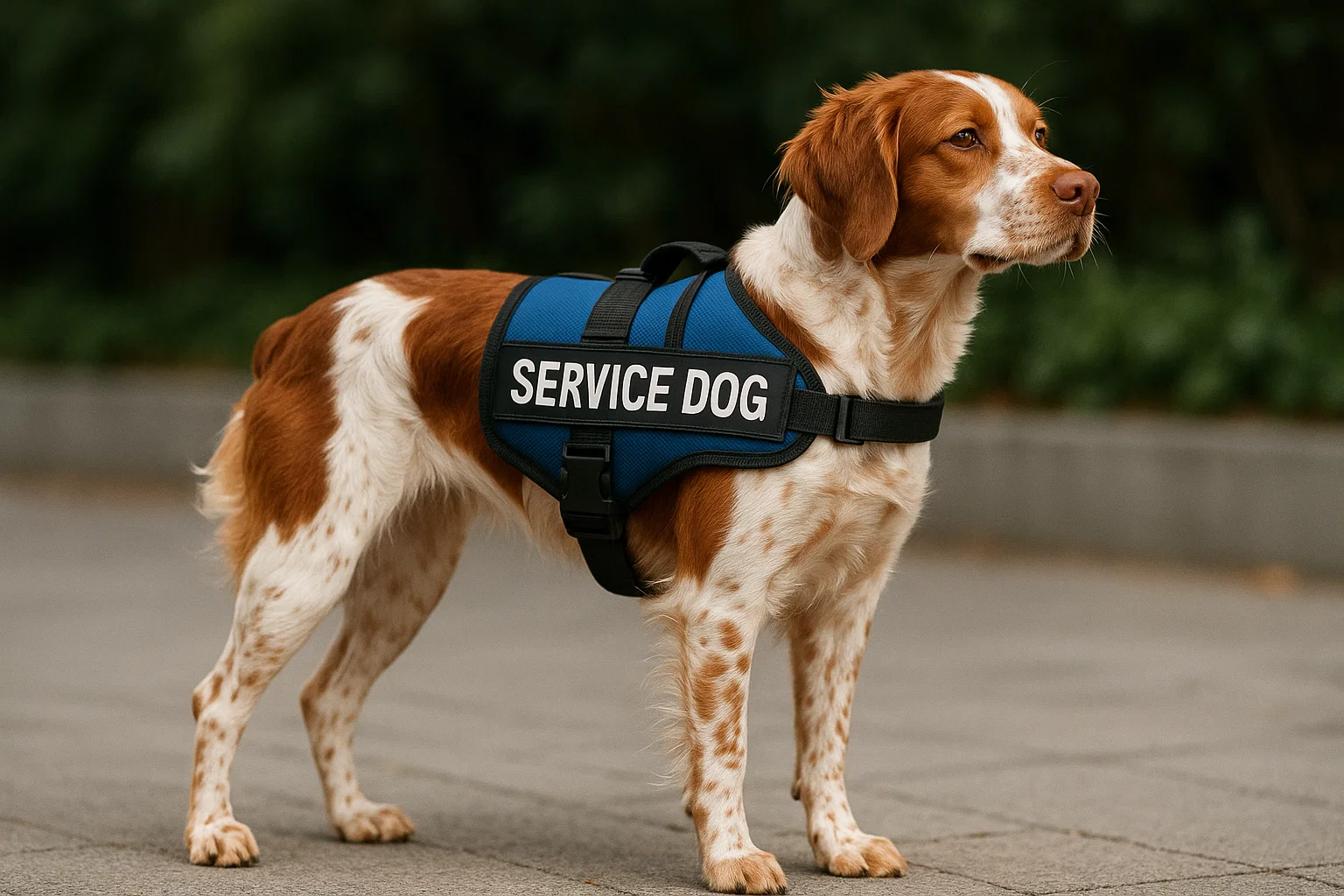Brittany as a Service Dog

The Brittany, known for its agility and boundless energy, is often considered an excellent choice for a variety of roles within the realm of canine service work. Although not the first breed to come to mind when discussing service dogs, the Brittany’s unique blend of physical attributes and temperament make it suitable for a range of service-related tasks. This article will provide an in-depth look at the Brittany as a potential service dog, covering its physical characteristics, temperament, and suitability for different types of service work.
Brittany Overview
Originating from France, the Brittany is a versatile sporting breed originally bred for hunting and retrieving birds. Known for its athletic build and keen senses, the Brittany has become popular not only as a hunting companion but also in competitive canine sports and as a family pet.
Physical Characteristics
Brittanys are medium-sized dogs, generally weighing between 30 to 40 pounds and standing 17.5 to 20.5 inches tall at the shoulder. Their compact size strikes an excellent balance between strength and agility, making them suitable for tasks that require both physical endurance and nimbleness. This size also makes them practical for service work in environments where larger breeds might be cumbersome.
- Size: Medium-sized, 30-40 pounds
- Height: 17.5-20.5 inches
- Physical Attributes: Muscular, with a dense coat—often a distinct orange and white or liver and white pattern
Their muscular build supports strength and stamina, useful in service work that demands sustained activity. The Brittany's coat, often medium in length with dense dog fur, is weather-resistant, making them adaptable to various climates and outdoor conditions. This adaptability is an asset for service dogs that may need to work in diverse environments.
Temperament and Attitude
The Brittany’s temperament is one of its most appealing traits for service work. Known for their intelligence, trainability, and eagerness to please, these dogs thrive on human interaction and companionship.
- Disposition: Intelligent, eager, good-natured
- Personality Traits: Affectionate, energetic, enthusiastic, alert
Brittanys possess a blend of attentiveness and sensitivity, vital for understanding and reacting to their handler's needs. This eagerness makes them potentially well-suited for emotional support and therapeutic visitation roles. However, their high energy levels mean that they require consistent exercise and mental stimulation. Without proper outlets, they might become restless, which can pose challenges in settings that require prolonged periods of calm behavior.
Their alert nature also renders them vigilant, which may be beneficial in roles involving medical alert duties. However, this vigilance must be balanced with focused training to ensure that they do not become overly excited in stimulating environments.
Types of Service Work
A Brittany’s versatility allows it to be trained for various types of service work, owing to its innate characteristics.
- Best Suited For: Medical Alert, Psychiatric Services, Emotional Support, Search and Rescue
- Less Suited For: Mobility, due to moderate size and strength limitations
Medical Alert: Brittanys, with their acute senses and attentiveness, can be trained to detect changes in their handler’s physiological state. This makes them good candidates for medical alert tasks, such as detecting seizures or changes in blood sugar levels in diabetic individuals.
Psychiatric Services: Their empathetic and attentive disposition aids those with psychiatric disabilities, including PTSD and anxiety disorders. They provide comfort and reassurance, helping to mitigate symptoms through grounding techniques.
Emotional Support: Due to their affectionate nature, Brittanys excel as emotional support animals, offering consistent companionship and enhancing the emotional wellbeing of their owner.
Search and Rescue: Their agility and drive make Brittanys effective in search and rescue operations, where they can employ their hunting instincts in structured task settings.
Health Considerations
Brittanys are generally a healthy breed, though they can be prone to certain breed-specific health issues, which potential service dog handlers should consider.
- Common Health Issues: Hip dysplasia, epilepsy, progressive retinal atrophy, ear infections
- Care Needs: Regular veterinary check-ups, balanced diet, ample exercise
Orthopedic Concerns: Conditions like hip dysplasia can impact their effectiveness in physically demanding service roles, and handlers need to assess each individual's health comprehensively.
Neurological Disorders: The propensity for seizures, while a concern for service work, can typically be managed with medication and regular veterinary care, minimizing risks.
Understanding these health factors is crucial for anyone considering a Brittany for long-term service work, as health issues could affect the dog's ability to perform consistent, reliable service.
Training and Suitability
The Brittany’s high intelligence and eagerness to please make them highly trainable, although their energy levels and potential for distraction require a handler with experience and patience.
- Trainability: High intelligence, quick learners
- Training Challenges: Requires consistent mental and physical stimulation, prone to distraction if not engaged
Structured training programs that combine physical and mental exercises are most effective. Brittanys respond best to positive reinforcement techniques, as these harness their natural enthusiasm and willingness to work with their handler.
In terms of suitability, the ideal candidate settings would provide a balance of structured tasks with ample time for exercise and play. Handlers who can invest in ongoing training and provide varied daily activities are best suited for this breed.
Summary of Brittany
In conclusion, the Brittany offers a unique blend of attributes that can be advantageous for specific service roles, provided their physical and mental needs are adequately met.
- Strengths: Intelligent, trainable, affectionate, versatile in service tasks
- Weaknesses: High energy requirements, potential for distraction, some health issues
- Ideal Service Roles: Medical Alert, Psychiatric Assistance, Emotional Support, Search and Rescue
While they may not be the first breed considered for traditional mobility tasks due to size, their adeptness in medical, psychiatric, and emotional support roles demonstrates the Brittany’s potential as a valuable and dedicated service dog for those who can meet their specific care requirements.











